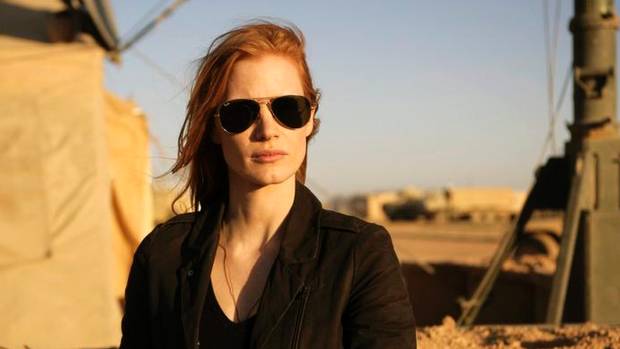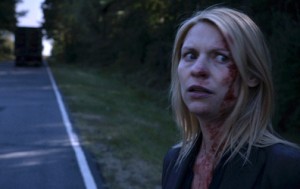Last night Rachelle and I watched Kathryn Bigelow’s new film, Zero Dark Thirty. A leading Oscar contender, the movie presents a realistic rendering of American Intelligence as it hunts down Osama Bin Laden. It’s achieved near universal critical acclaim, and so it was with some optimism and excitement that I began to watch.
However, soon enough I found myself distracted, focused more on placing the actors in their previous incarnations than whatever was unfolding on the screen.
“Look, there’s the guy from Parks and Recreation!”
“There’s Coach Taylor from Friday Night Lights!”
“I think the guy from The Sopranos is wearing a fake nose.”
“Man, that Jessica Chastain looks exactly like a young Julia Roberts!”
I don’t typically do this sort of thing when I’m watching a movie, so I figured that there must be something about Zero Dark Thirty, in particular, that was calling forth such a response. It was simple, I guess, the actors seemed more real to me than the characters that they were playing.
There was nobody in the movie that I liked or was particularly interested in, everybody seeming little more than a collection of suits doing their jobs. This might have been the directorial intent, but it kept me at an emotional and visceral distance, and the entire movie seemed procedural rather than human.
It was hard not to think of the TV show Homeland while watching, and how much of a better, deeper exposition of similar terrain it was than Zero Dark Thirty. I mean, I really, really liked Homeland, and had all sorts of feelings about the characters in the show, rather than about the actors hired to be those characters. Cable TV, with long narrative arcs, has become like reading a novel, while movies, with just 90 minutes or so, (or in the case of Zero Dark Thirty, 157 minutes) has to tell you a kind of hieroglyphic story, one that has to have an immediate commercial punch. And so TV shows, now digested slowly, as seasons rather than episodes, are like novels, and movies are more like an episode of a TV show, bound by all the limits of the prime time formula. It’s ironic, this, but such is life, and it is funny to observe that the consensus best movie of the mainstream this year, pales in comparison to one of the best TV shows of the year.
Sententious films like Lincoln and Zero Dark Thirty–arguably made for critics and awards shows– rarely end up serving the audience, whereas films like Pitch Perfect or The Perks Of Being A Wallflower, that are built to serve the audience, are actually much greater critical accomplishments. When the intent is to create something serious for an audience, or the critics that hover above the audience, rather than something authentic or organic within the artist, the results are always distant and insufficient, a suggestion of intent rather than the realization of it, and that artifice will always keep the true audience at bay.





Comments
8 responses to “On Seeing the movie Zero Dark Thirty”
I posted on Facebook, sir… but my thanks and love for being brilliant, as always.
Jon, I thank you for this and for all your encouragement and support, it is very kind and very much appreciated.
You are ignoring the single most important point: This film was directed by a woman. As such, any so-called insight you may think you have is in reality nothing more than the irrelevant observations of a man mired in an outmoded patriarchal paradigm. Plus, it’s got cool explosions ‘n shit.
Foog:
I straight up loved The Hurt Locker, Bigelow’s last film, and after that ran about shouting that only women should make action movies. Honestly, I thought she had a lyrical, sincerely emotional eye she brought to bear on the picture that made it the exceptional film it was, but I just didn’t see it in Zero Dark Thirty. As I said, I didn’t particularly care about anyone it, but you are right, it did have cool explosions and shit, and the scope of the film was vast. It pushed a lot of the right buttons, but it just didn’t seem to have the soul I’d been expecting from her.
A side note to this is that movies are changing. They say that the enemy of the great is the good, and with long form, adult TV becoming the ascendent delivery system for literary entertainment, the tiny slice of time left for movies to tell competing stories seems insufficient. Ambitious movies, those without a swift, “poppy” agenda, almost always seem like failures to me, because the stories that try to tell would so clearly have been better expressed on TV. For instance, while watching Lincoln, and knowing that Tony Kushner had written a 5000000 pages script, I kept wondering why they didn’t make it an HBO show. It would have been riveting, a kind of Roots for a new generation, but instead they truncated it, made it into a movie and threw in some familiar, entertaining Spielberg flourishes that were meant to please the audience. It’s all money, of course, with mainstream Hollywood going for prequels and sequels that will move product and creating action films for the global market. The movies that I’m criticizing are those made for the Academy, the studio prestige films that are currently out of step with the world around them.
agreed. 90 minutes is a squeeze. wonder why more movies aren’t sprawled out into 3, 4 or 5 parters, since there is usually a heckuva lot on the cutting room floor. imagine the bonzo box office action as each part is released, say a month after the first? mr. quentin did this with killing billy elliot to great effect. and then …. nada.
Hate to be a contrarian but *cough* The Hobbit *cough*. Seems to me that the entertainment industry is perfectly happy to stretch stories beyond thin when it suits them.
…maybe there’s some counter-intuitive principle at work here. If the script can fit on a cocktail napkin, it has to be a 9-hour triptych minimum, otherwise cut cut cut.
Foog:
I have not yet had the pleasure of seeing The Hobbit, and don’t imagine an occasion where we might meet in the near future. One of the consequences of the new market movies must compete in is that the “prestige” films ( those made for award considerations) are actually longer and bigger and more full of things. Again, I think that this is to compete against the literary arc of the television season. The movie industry is doing “something” to be different than the commercial releases aimed at the teen and global market, and the TV shows, so they make long movies, trying to fill the in between space that nobody really wants to inhabit.